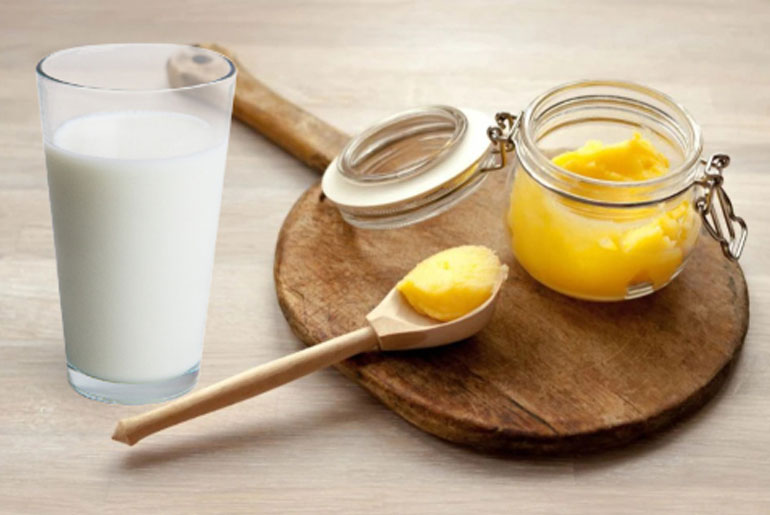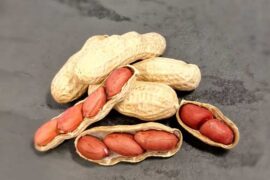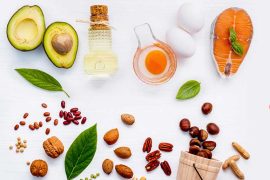Ghee, a clarified form of butter, holds a prominent place in various culinary traditions and holistic health practices worldwide. Known for its rich, nutty flavor and high smoke point, ghee is created by simmering butter and removing the milk solids, resulting in a pure, golden liquid. Beyond its culinary appeal, ghee boasts several potential health benefits, including being rich in fat-soluble vitamins like A, E, and K, as well as conjugated linoleic acid (CLA), which may have antioxidant and anti-inflammatory properties. Additionally, ghee is prized for its role in Ayurvedic medicine, where it is believed to promote digestion, enhance absorption of nutrients, and support overall well-being when consumed in moderation. However, like any high-fat food, ghee should be enjoyed in moderation as part of a balanced diet.
Nutritional Power of Ghee:
Ghee, a type of clarified butter, is primarily composed of fats, with small amounts of vitamins and other nutrients. Here’s a breakdown of the nutritional content of ghee per 1 tablespoon (approximately 14 grams):
- Calories: About 112 calories, which is similar to other fats like butter and oil.
- Fat: Ghee is rich in fat, with approximately 12.7 grams per tablespoon. The majority of this fat is saturated fat.
- Saturated Fat: Around 8 grams per tablespoon. While high in saturated fat, ghee also contains medium-chain triglycerides (MCTs), which are considered healthier fats.
- Cholesterol: Ghee contains about 33 milligrams of cholesterol per tablespoon.
- Vitamin A: Ghee is a good source of vitamin A, providing about 108 international units (IU) per tablespoon.
- Vitamin E: It also contains small amounts of vitamin E, an antioxidant, with approximately 0.4 milligrams per tablespoon.
- Vitamin K: Ghee contains trace amounts of vitamin K, providing about 1.3 micrograms per tablespoon.
- Butyric Acid: Ghee contains butyric acid, a short-chain fatty acid that may have benefits for gut health.
It’s important to note that ghee is primarily composed of fats, including saturated fats, which should be consumed in moderation as part of a balanced diet. While ghee does contain some vitamins and other nutrients, its main contribution to the diet is as a source of energy from fat. As with any food, it’s essential to consider portion sizes and overall dietary intake when incorporating ghee into your meals.
Indeed, one of the notable advantages of ghee is its lactose and casein-free nature, making it suitable for individuals who are lactose intolerant or have dairy allergies. During the clarification process, milk solids, which contain lactose and casein, are removed from the butter, leaving behind only the pure butterfat. As a result, ghee retains the rich flavor and nutritional benefits of butter without the potential digestive issues associated with lactose and casein. This makes ghee an excellent alternative for those seeking a dairy-free option for cooking, baking, or spreading on toast.
Benefits of Adding 1 Tablespoon of Ghee to Your Milk:
- Enhanced Nutrient Absorption: Ghee contains fat-soluble vitamins A, D, E, and K, which can be better absorbed when consumed with fat. Adding ghee to milk may enhance the absorption of these vitamins, supporting overall health.
- Improved Digestion: Ghee is known for its digestive properties in Ayurveda. The combination of ghee and milk may help soothe the digestive system and promote healthy digestion, making it easier for the body to absorb nutrients from food.
- Bone Health: Milk is a good source of calcium, while ghee contains vitamin D. Consuming ghee with milk may support bone health by providing both calcium and vitamin D, which are essential for bone strength and density.
- Weight Management: The combination of ghee and milk provides a source of healthy fats and protein, which can help keep you feeling full and satisfied. Including ghee in milk may help stabilize blood sugar levels and reduce cravings, supporting weight management efforts.
- Joint Health: Ghee contains compounds that are believed to support joint health and lubrication. Consuming ghee with milk may help alleviate joint stiffness and discomfort, especially in individuals with arthritis or other inflammatory conditions.
- Enhanced Immunity: Ghee contains butyric acid, a short-chain fatty acid that may have immune-boosting properties. Adding ghee to milk may help support immune function and protect against infections and illnesses.
- Promotion of Healthy Skin: The vitamins and fatty acids present in ghee can help nourish and moisturize the skin from within. Consuming ghee with milk may contribute to healthy, radiant skin.
- Mental Well-being: Ghee is believed to have a calming effect on the nervous system. Adding ghee to warm milk before bed may promote relaxation and improve sleep quality, supporting overall mental well-being.
Overall, adding ghee to milk can be a nutritious and comforting addition to your diet, providing a range of health benefits. However, individual responses may vary, so it’s essential to listen to your body and consult with a healthcare professional if you have any concerns or underlying health conditions.
Disclaimer:
The information contained in this article is for educational and informational purposes only and is not intended as a health advice. We would ask you to consult a qualified professional or medical expert to gain additional knowledge before you choose to consume any product or perform any exercise.







